How Important is Your Choice of Training Philosophy?
We took a poll last week on the following: “Which attribute is the most important, most often, for most people (pros and AGers), for success in triathlon at the 70.3 distance and up.”
I listed 8 attributes and none are, to me, inconsequential to success. These are sort of the Big 8. Just under 1,400 of you took this poll, and here is how it came out.
Our flash poll has obvious limitations and one is the inability to rank things. (I’m working on that!) I had the freedom to do what you could not: to rank each of these in order of importance. I did so before the poll commenced, so as not to let your answers bias my ranking. In some cases we agree and in other cases we (strikingly!) disagree.

I thought I might write a few paragraphs about each of these elements in a series of installments.
Specific Training Regime
I hope you won’t misunderstand me, but I fear you might’ve. Perhaps I did not make myself clear in my question.
What I meant to ask is this, and let me give you an example: Let us say you had a choice of 3 coaches, and they each had vastly different training philosophies. I do think it’s important which coach you choose. This is one of the 8 important elements to success.
But if you choose your coach unwisely I think that of all the elements above, this is of lesser importance. Why? Because throughout my 40 years as an endurance athlete I’ve seen athletes prevail using long slow distance, with high intensity work the casualty of that theory, as their predominant training philosophy. I have also seen the opposite. I remember triathlete Greg Whitely – a onetime 13:25 5000 meter runner – tell me he rarely ran more than 55 miles a week during his tenure as a world class runner.
But I also wrote about the final run of the Mark Covert, who didn’t miss a daily run for 45 years, and who was wedded to the philosophies of Gerry Lindgren, Dave Bedford and the other hard men of running in the late 60s and early 70s who often ran 200 miles a week and, like Whitely, were 5000m and 10,000m runners. I don’t know that Covert was blessed with exceptional talent. But he got the most out of his body and in his day he was a bad, bad man, in the best sort of way.
I do feel that certain runners are suited to particular philosophies. In noting Gwen Jorgensen’s move to the marathon she stated to us, “I will need to run well over 100 miles a week.” We’ll see. I’m not convinced of that need, for her. But I do think that Gwen may well find success in a 70 mile-per-week regime, or at 120 miles-per-week. I don’t think that this choice is a prime determinant of her success as a marathoner.
It’s not that I think this an important decision, and perhaps you all thought I meant something else by "Specific Training Regime" because you ranked this 3rd in importance. I do think the decision of what philosophy and regime you choose is important, perhaps the 8th most important decision you'll make as an athlete (more important than your specific choice of bike or tire brand or model). I just think there are 7 more important elements that will determine your success.
Next I'll write about what I think the 7th most important element to success is, in my countdown to #1. You'll be surprised at my selection for the #2 slot.




